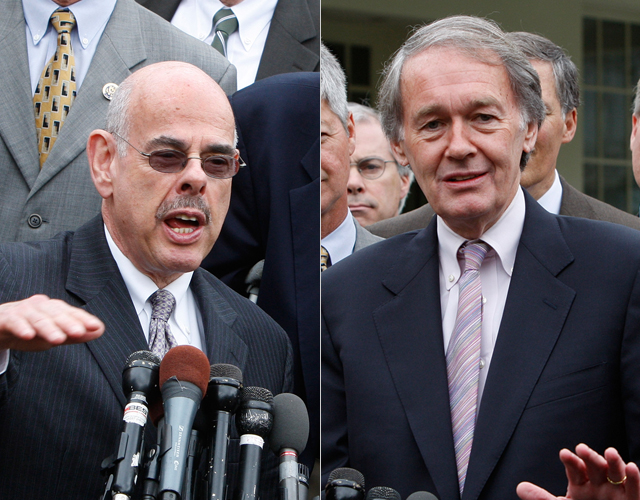After months of grueling hearings and deliberations, the House Energy and Commerce Committee passed the Waxman-Markey climate and energy bill by a vote of 33-25 on Thursday evening. It’s a landmark occasion, the first time a serious climate bill has made it this far in the House.
The bill would cut greenhouse-gas emissions about 17 percent below 2005 levels by 2020, and about 80 percent by 2050, while promoting renewable energy and energy efficiency.
“We are now one step closer to delivering on the promise of a new clean energy economy that will make America less dependent on foreign oil, crack down on polluters, and create millions of new jobs all across America,” said President Barack Obama in a written statement.
The vote fell largely along party lines, with only one Republican voting yes — Mary Bono Mack (Calif.) — and four Democrats voting no — John Barrow (Ga.), Jim Matheson (Utah), Charlie Melancon (La.), and Mike Ross (Ark.). But the Dems who did support the bill represent diverse constituencies — coal states, industrial districts, and agricultural areas, as well as coastal regions.
As the bill was debated this week, Republicans on the committee offered dozens of amendments intended to weaken it or kill it entirely, but Democrats stood united behind the bill, approving only one insignificant GOP amendment. That’s thanks to hard work done ahead of time by Committee Chair Henry Waxman (D-Calif.) and his bill coauthor, Ed Markey (D-Mass.), who negotiated at length with moderate Democrats to craft a bill they could support. (Most Republicans had made it clear that their opposition to the bill was nonnegotiable.)
Rep. Joe Barton (R-Texas), the ranking Republican on the committee and an outspoken climate skeptic, offered a substitute amendment that would have removed the cap-and-trade provision from the bill, invalidated the Supreme Court’s Massachusetts v. EPA climate decision, and ramped up production of oil, gas, coal, and nuclear power. That went down in flames, with all Democrats and one Republican, George Radonovich of California, voting against it, plus two other Republicans, John Shadegg of Arizona and Greg Walden of Oregon, voting “present” rather than weighing in one way or another.
Democrats offered a number of their own amendments, most successful, but none of them significantly altered the bill. An amendment from John Dingell (D-Mich.) would create a program within the Energy Department to make loan guarantees for clean-energy technologies, and other amendments added tree-planting programs and a system of voluntary labeling to note the carbon content of consumer goods.
That’s just the beginning
While the fight to pass the bill out of committee was tough, there are lots more hurdles to be jumped before the legislation can get to the House floor to be voted on by all representatives. And in the Senate, it will likely be even harder to push a climate bill through.
At least six other House committees have jurisdiction over some portion of this bill, including the Ways and Means Committee, which oversees legislation pertaining to taxes and other revenue sources. In that committee, John Larson (D-Conn.) has offered a carbon-tax bill and Chris Van Hollen (D-Md.) has proposed a cap-and-dividend bill. They will want to play a role in shaping the final legislation. Meanwhile, Ways and Means Chair Charles Rangel (D-N.Y.) has said he wants to work on health care before taking up the climate bill.
Agriculture Committee Chair Collin Peterson (D-Minn.) has threatened to derail Waxman-Markey unless the EPA backs off from proposed rules on the greenhouse-gas footprint of ethanol. He’s demanded veto power over the provisions of the bill, and says if he doesn’t get it, his committee’s 26 Democrats will vote against the bill on the floor. This could be a lethal blow; the bill needs 218 votes to pass, and Democrats hold 254 seats, but a few dozen Dems are already expected to vote against it.
There’s also worry that reps who voted for the bill in committee might still try to weaken it on the floor. Rick Boucher (D-Va.), who led the group of moderates that negotiated the bill’s standards down in committee, has said he may try to lower the goals for emissions cuts. Dingell has also suggested that the cuts should be lower.
Green group reax
While there’s division in the environmental community over this bill, many greens were delighted to see it pass out of committee, and are pledging to work to make it stronger as it moves through other committees.
Gene Karpinski, president of the League of Conservation Voters, hailed the “historic” passage of the bill, saying it’s “the most important environmental vote this committee has ever taken.” He noted that while the bill isn’t perfect, it’s a “down payment” on action.
Anna Aurilio of Environment America said the bill “fires the starting gun for a green energy economy and the solutions to global warming.” She continued, “My hope is we’re going to throw our shoulders to the wheel on a set of amendments to strengthen this bill.”
Sierra Club Executive Director Carl Pope said, “Moving a comprehensive clean energy jobs plan through a committee historically dominated by those with ties to the oil, coal, and other polluting industries is a laudable victory and truly historic accomplishment. … As this piece of legislation moves forward we will work with our allies to mount a vigorous effort to strengthen this bill.”
Karpinski is optimistic about getting a good bill passed, calling House Speaker Nancy Pelosi the “single biggest champ” for tough climate and energy legislation. Aurilio is also hopeful about improving the bill as it moves through both the House and Senate, even though recent news from the Senate on renewable electricity and efficiency standards has not been very good.
The bill is expected to go to the full House before the August congressional recess, possibly even before the July 4 recess. The Senate probably won’t act on it until September.



